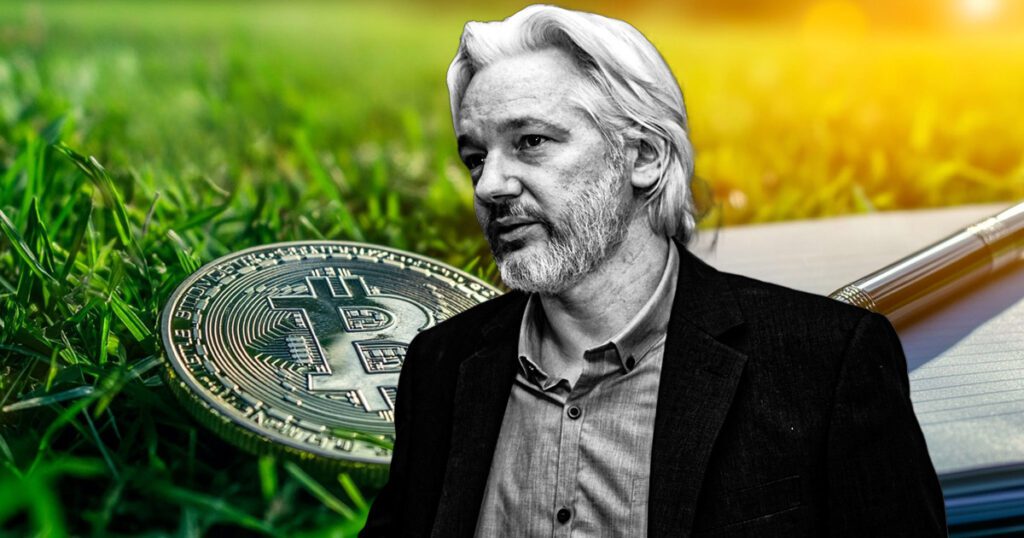

The following is a guest post from Kadan Stadelmann, CTO of Komodo Blockchain.
Although Julian Assange was released from prison in June, his first appearance did not take place until the beginning of the month. He testified before the Council about the psychological effects of his incarceration before the Committee on Legal Affairs and Human Rights of the Parliamentary Assembly of the Council of Europe in Strasbourg, France, which includes legislators from 46 European countries .
“I want to be completely clear. I am not free today because the system worked,” Assange began his speech to the Council of Europe earlier this month. “I am free today because after years of incarceration, I pleaded guilty to journalism. I pleaded guilty to seeking information from a source.
“I pleaded guilty to seeking information from a source,” said Assange. “I pleaded guilty to obtaining information from a source. And I pleaded guilty to informing the public of this information.
From 2012 to 2017, Assange lived in the Eucadorian embassy in London, where he was granted asylum. From 2019 to 2024 he was held in a British maximum security prison. “It takes away the sense of self, leaving only the raw essence of existence,” he says shakily. He apologized for his “hesitating words” and “unpolished presentation.”
Assange admitted:
“I’m not yet fully equipped to talk about what I endured: the relentless struggle to stay alive, both physically and mentally.”
The Parliamentary Assembly of the Council of Europe published a report on Assange’s incarceration, calling him a “political prisoner.” They expressed concern over his treatment, saying the charges against him by the United States were “disproportionate” and “harsh.”
Assange’s Ties to Bitcoin Are Clear
WikiLeaks began accepting Bitcoin after global financial institutions placed WikiLeaks in what its founder called a “financial blockade.” He started with PayPalwho initially said he had received a letter from the State Department before correcting the story and saying he had made his decision after seeing the intentionally misleading letter the State Department sent to PayPal.
And then, institution after institution, they also blocked WikiLeaks on their platforms. Visa, MasterCard and Bank of America have blocked donations. The institutions cited their “conditions of service” to justify the decision to block donations.
Assange, public enemy number one
WikiLeaks sinned against the powers that be by publishing more than 250,000 US State Department cables that it received from former military intelligence analyst Bradley Manning, now known as Chelsea. WikiLeaks had also exposed the CIA’s infiltration of French political parties, spying on French and German leaders and the injection of software into smart TVs, cars and iPhones.
Some members of the international community have spoken out against the blockade. The United Nations High Commissioner condemned this action. The same was true for the United Nations special rapporteur on the promotion and protection of the right to freedom of opinion and expression, as well as for the special rapporteur of the Inter-American Commission on Human Rights on the freedom of expression.
Although the US State Department has called WikiLeaks’ action illegal, the publication of classified documents is not illegal in the United States. No charges have been filed. Ultimately, WikiLeaks won some small victories. The Reykjavík District Court in Iceland has ruled that a block against WikiLeaks’ credit card donations should be lifted within two weeks.
“This is a significant victory against Washington’s attempt to silence WikiLeaks,” WikiLeaks founder Assange said in a statement about the victory in Iceland. “We will not be silenced. Economic censorship is censorship. This is false. When this is done outside the rule of law, it is doubly wrong. Those involved in the attempt to censor WikiLeaks will find themselves on the wrong side of history.”
Assange considers Bitcoin an important innovation, but other blockchain use cases are simply, if not more, important.
Assange is a man who proved too dangerous to the military-industrial complex to walk the streets freely because people trusted him with their secrets. It’s a miracle that he’s alive. Assange is also a man who played an important role in the emergence of Bitcoin.
Assange’s View on Bitcoin and Blockchain
Assange was released from prison in June and launched into a new world order: a world of lockdown, inflation and war on the European continent. Assange lamented during his press conference how much ground had been lost in the fight for freedom since his incarceration. But it’s not all bad news. There is increased public awareness. And, at the same time, the integration of Bitcoin into society has only grown over time.
Nation states such as Bhutan and El Salvador hold Bitcoin. The United States may not be that far behind. We are talking about hyperbitcoinization and Bitcoin Standard. But that may not be what Assange finds most interesting about blockchain. In an AMA, he revealed that he sees great potential for blockchain and journalism. In fact, blockchain could save us from the memory hole.
Assange said in a Reddit AMA:
“The real innovation of Bitcoin is the publication of a globally verifiable proof at a given point in time. The entire system is based on this concept and many other systems can also be built on this basis. Blockchain traces history, shattering Orwell’s dictum that “He who controls the present controls the past, and he who controls the past controls the future.”
Assange credits Bitcoin with “helping us overcome the US extralegal banking blockade.”




